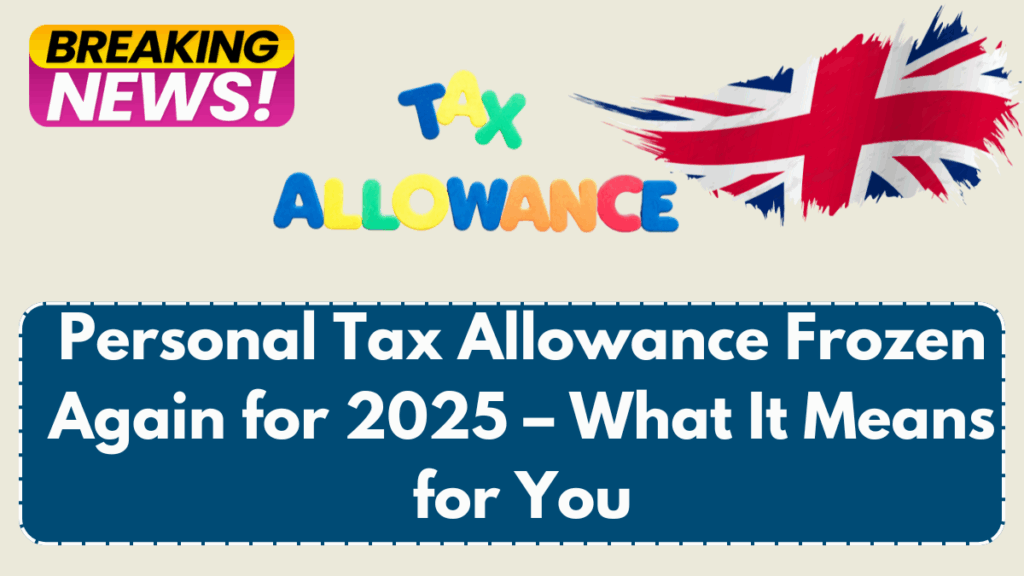As of May 2025, the UK government has confirmed that the UK personal tax allowance 2025 will remain frozen at £12,570. This means for the fifth consecutive year, there’s been no increase in the amount of income you can earn before paying income tax. Originally set in April 2021, this threshold freeze is now impacting more taxpayers due to wage inflation and bracket creep.

The Impact of the Frozen Tax-Free Income Threshold
The tax-free income threshold freeze is effectively pulling more individuals into higher tax brackets, even if their earnings have only risen slightly due to inflation. For many, this feels like a stealth tax. While wages have increased modestly to keep pace with the rising cost of living, the unchanged allowance means more of that extra income is being taxed.
Here’s a simple breakdown of how this plays out:
Year | Personal Allowance | Inflation Rate | Real Impact |
|---|---|---|---|
2021 | £12,570 | 2.5% | Standard |
2022 | £12,570 | 9.1% | Erosion |
2023 | £12,570 | 10.4% | Major Loss |
2024 | £12,570 | 4.2% | Continued Loss |
2025 | £12,570 | 3.4% (est.) | Compounded Loss |
While the threshold remains the same, everything else is getting more expensive. This means real income after tax is decreasing for millions.
HMRC Updates 2025: What’s New Besides the Freeze?
Though the HMRC updates 2025 don’t include a rise in the personal allowance, there are changes elsewhere. For instance, HMRC has adjusted the thresholds for National Insurance contributions slightly and introduced new reporting requirements for digital income. If you freelance or earn through online platforms, expect more scrutiny and compliance demands starting from July 2025.
Also worth noting: the High Income Child Benefit Charge (HICBC) threshold is being revised. It’s rising from £50,000 to £60,000, which is a small relief for dual-income households, though the frozen personal allowance largely overshadows these tweaks.
What the Frozen Personal Allowance Means for You
If your salary has gone up in 2025, even by a modest amount, you might notice a smaller increase in your take-home pay than expected. This is due to fiscal drag—where stagnant tax thresholds result in higher effective taxation. You’re not alone: millions are now paying basic or even higher-rate tax when they weren’t just a year or two ago.
Some key effects:
- Pensioners and low-income workers could start paying tax again.
- Middle-income earners may enter higher tax bands.
- Employers might need to adjust salary reviews to reflect the diminished impact of raises.
Financial planning in 2025 must take into account the cumulative effect of frozen allowances over multiple years.
How to Navigate the 2025 Tax Landscape
Despite the freeze, there are steps you can take:
- Maximise ISA allowances: You can still save up to £20,000 tax-free.
- Use salary sacrifice for pensions or childcare vouchers to reduce taxable income.
- Check eligibility for marriage allowance if your spouse earns under the threshold.
Additionally, keep an eye on further HMRC updates 2025, especially as the next budget approaches in autumn. Speculation suggests tax reform could become a priority issue heading into the 2026 general election.
Conclusion
The UK personal tax allowance 2025 freeze may seem like a technical holdover, but it has very real financial consequences. While the headline figure hasn’t changed, your tax bill probably has. Understanding how this fits into broader fiscal policy and your personal finances is essential for making smart money decisions this year.
FAQs
Why is the UK personal tax allowance still frozen in 2025?
The government has kept the threshold at £12,570 to maintain fiscal discipline, though critics argue it disproportionately affects middle and lower earners by increasing their tax burden in real terms.
Will the tax-free income threshold change in 2026?
No official announcements yet, but it’s widely expected that the next government may revise it, especially under pressure from inflation and voter sentiment.
Are there any other 2025 HMRC updates I should be aware of?
Yes. HMRC has made changes to National Insurance bands and introduced new digital income tracking measures that start rolling out in July 2025.
How can I reduce my tax bill in 2025?
Use ISAs, pension contributions, salary sacrifice schemes, and check for any government allowances or credits you might qualify for.
Does this affect people on Universal Credit?
Not directly. But any increase in gross income due to inflation could affect your Universal Credit entitlement calculations.
Click here to learn more
